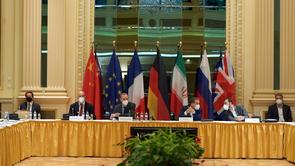 This handout photo taken and released on May 1, 2021 by the EU Delegation in Vienna shows delegation members from the parties to the Iran nuclear deal - Germany, France, Britain, China, Russia and Iran – attending a meeting at the Grand Hotel of Vienna as they try to restore the deal.
(HANDOUT/ EU DELEGATION IN VIENNA / AFP
This handout photo taken and released on May 1, 2021 by the EU Delegation in Vienna shows delegation members from the parties to the Iran nuclear deal - Germany, France, Britain, China, Russia and Iran – attending a meeting at the Grand Hotel of Vienna as they try to restore the deal.
(HANDOUT/ EU DELEGATION IN VIENNA / AFP
DUBAI - Iran said on Saturday it believes a reinstatement of its 2015 nuclear deal with major world powers is possible but warned that Tehran “will not negotiate forever”.
"Out of a steadfast commitment to salvage a deal that the US tried to torpedo, Iran has been the most active party in Vienna, proposing most drafts," Iranian Foreign Ministry spokesman Saeed Khatibzadeh said on Twitter, referring to talks aimed at reviving the nuclear deal.
Iran and the United States have been holding indirect talks on reviving the 2015 agreement between Tehran and six powers that imposed restrictions on Tehran's nuclear activities in exchange for lifting international sanctions
Iran and the United States have been holding indirect talks on reviving the 2015 agreement between Tehran and six powers that imposed restrictions on Tehran's nuclear activities in exchange for lifting international sanctions.
Then US President Donald Trump withdrew Washington from the agreement in 2018, but President Joe Biden has been seeking to revive it. Officials on all sides have said there are major issues to resolve before the deal can be reinstated.
ALSO READ: IAEA demands Iran answer on nuclear monitoring pact
"Still believe a deal is possible, if the US decides to abandon Trump's failed legacy. Iran will not negotiate forever," Khatibzadeh tweeted.
The UN nuclear watchdog on Friday demanded an immediate reply from Iran on whether it would extend a monitoring agreement that expired overnight. An Iranian envoy responded that Tehran was under no obligation to provide an answer.
The Vienna talks, which began in April, are now in a pause that had been expected to last until early July, but failure to extend the monitoring accord could throw those negotiations into disarray.
READ MORE: IAEA chief: Nuclear deal must await new Iran government


